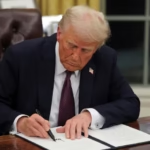
South Africa’s government has scrapped a controversial proposal to raise the value-added tax (VAT) following strong opposition from political parties and civil society organizations. The proposed 1% VAT increase, which would have been phased in over two years, aimed to bridge a projected budget deficit of R75 billion (approximately $4.02 billion).
In a statement released on Thursday, the National Treasury confirmed the withdrawal of the plan, citing consultations with key political stakeholders and parliamentary committees. Despite the reversal, the Treasury cautioned that tough fiscal decisions now lie ahead, including potential cuts to welfare payments for low-income households.
The now-abandoned tax hike had raised alarm among South African citizens, many of whom had begun receiving notices from service providers about imminent price increases, originally scheduled to take effect from May 1. The VAT increase would have immediately intensified pressure on household finances, particularly for low- and middle-income earners.
The Treasury had justified the proposed increase as necessary to restore critical funding for frontline services such as healthcare and education, sectors that have experienced years of budget cuts due to fiscal constraints.
Initially, the plan was to implement a 0.5% VAT increase in 2025, followed by another 0.5% hike in 2026. However, opposition emerged even within the ruling African National Congress (ANC) and its coalition partner, the Democratic Party, ultimately stalling the proposal’s legislative progress.
Finance Minister Enoch Godongwana has since communicated with Parliament to formally retract the Appropriation and Division of Revenue Bills, paving the way for alternative budget adjustments to fill the funding gap left by the decision not to raise VAT.
“There have been various alternative proposals, but many could lead to more severe consequences for economic growth and employment,” the Treasury noted. “Others, while potentially valuable, would not generate immediate revenue to replace the VAT increase.”
The last time South Africa increased VAT was in 2018, during a period of acute financial stress that followed years of mismanagement under former President Jacob Zuma and the country’s subsequent loss of its investment-grade credit status.
Despite being a significant revenue generator, VAT remains a politically charged issue. With unemployment exceeding 30% and inequality deeply entrenched, many South Africans perceive the tax as regressive—even though essential goods commonly used by poorer households are zero-rated.
The government now faces the challenge of balancing fiscal discipline with social protection, especially in a country still grappling with economic recovery and high levels of poverty.


